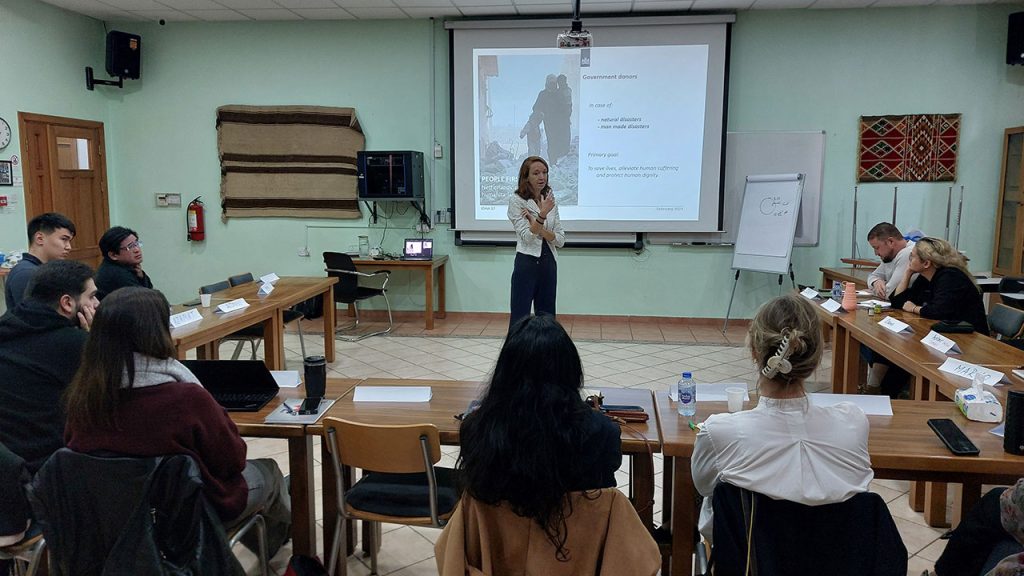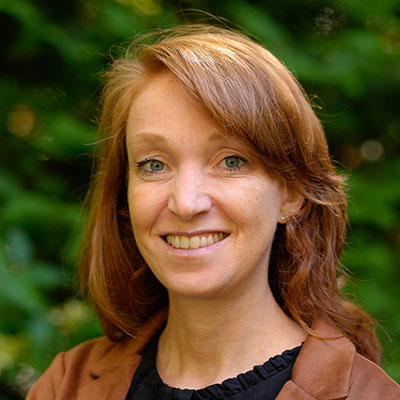In a world that sometimes seems profoundly broken, there are still people whose first instinct is to run toward danger to help others.
For over 25 years, Fordham has given them the skills they need to do that work safely and effectively.
Through the Institute of International Humanitarian Affairs (IIHA), Fordham offers the International Diploma in Humanitarian Assistance (IDHA), a unique training program for humanitarian workers from all over the world.
The four-week residential immersion course is designed to train and develop those working for humanitarian aid organizations who are looking to advance their careers.
The Trainings
The 59th IIHA training session, which finished last month, took place in Amman, Jordan. The next one is scheduled for May 4 to 30 in Pretoria, South Africa. Trainings are now mainly offered in the Global South as part of an effort to empower aid workers who are closer to communities affected by war, famine, and natural disasters.
The goal of the training is to help students develop a holistic understanding of global humanitarian issues, as well as on-the-ground skills. That means learning about “big picture” aspects of the field, such as international humanitarian law and The Grand Bargain, a 2016 agreement between donors and humanitarian organizations. It also means learning and studying the fields of shelter and camp management and human trafficking, particularly during a humanitarian crisis.
Staying Safe in Dangerous Times
Martine van der Does, the IIHA’s newly appointed Helen Hamlyn Humanitarian Fellow & Global Program Director, said that it is a sad reality that the training has become even more important as the field has become more complex and dangerous in the last few years.
Van der Does, who oversees the IDHA, noted that last year, the United Nations reported that a record 281 aid workers were killed, of which 96% were local staff.
“Humanitarian aid has become more complex, and there is far less respect for international humanitarian law and humanitarian principles,” she said.
To that end, one full day of the program is devoted to key trends and threats to humanitarian workers, trauma first aid basics, personal health, and mental and physical resilience in humanitarian settings.
New Leadership
Van der Does, a former diplomat and regional humanitarian coordinator for the Netherlands government, is an IDHA alum, having completed the training in 2008. She earned a master’s in international humanitarian action from Fordham in 2017 and served as a tutor and course director for five recent IDHA training sessions.
“I always said if I could make a full-time job out of this, it would be my dream job,” she said.
The seamless bridge between fieldwork and academic theories taught in the classroom is a hallmark of the IDHA, and the reason Van der Does said she’s excited to have returned to lead the training.
“Because of our network and our alumni database, we are able to bring in front-line aid workers complementing theory with the most recent realities on the ground,” she said, citing Gaza as an example.
Graduates Hail from Many Countries, Work in Myriad International Organizations
After graduating from the IDHA program, Van der Does joined Doctors Without Borders. She was sent to Niger, where she coordinated the construction of health centers and hospitals. Her experience was similar to other IDHA graduates, who have gone on to work in administrative and field positions at organizations such as UNICEF, Save the Children, International Committee of the Red Cross, and Jesuit Refugee Corps.
She said she thrived in part because of the experience she gained from working on IDHA assignments with classmates hailing from Iraq, Belgium, Italy, the U.S., and Sudan.
“One of my fondest memories from that time in Niger is the long days I spent traveling on hot, sandy roads to the various health centers we were working in,” she said.
“I sat in the front of a pickup truck with AS, who was my driver, and Ali, who was my construction assistant, discussing culture and politics while a desert landscape with camels and bedouins passed our window views. It was a perfect way to learn about the context I was working while also building unforgettable friendships.”


